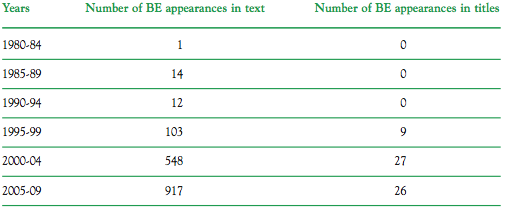…is quite limited, according to an article of this title by Judge Douglas Ginsburg and Derek Moore of Cadwalader that appeared in the most recent Competition Policy International Journal. This despite the surge of scholarship on the subject in legal journals over the last decade shown in the following table:
Ginsburg & Moore fault the failure of behavioral economics to provide neat rules of decision in particular cases for its lagging incorporation into judicial opinions. But it is really the lack of a particular kind of rule in behavioral economics that they find so disagreeable to modern antitrust jurisprudence — namely, the kind of rule that exonerates broad categories of business conduct and narrows antitrust law’s scope. Neoclassical price theory is very good at providing such rules, and consequently has been embraced by “a Supreme Court [that] has labored for more than 30 years to reign in and rationalize antitrust law.”
Yet even in the face of this project, there may be a role for behavioral economics in lower court practice for the savvy attorney. Recent Supreme Court cases invite lower courts to examine the plausibility of the claims made in antitrust cases at the very beginning, even before any evidence has been gathered and put before the court. Under these precedents, neoclassical theory is often employed to show that accused conduct could not be harmful to consumers in an efficient market, and antitrust cases are increasingly dismissed at the outset on such grounds. But behavioral economics is excellent above all else in showing where the efficient market hypothesis breaks down. By providing concrete reasons why the assumptions of neoclassical price theory may not obtain in a particular case, behavioral economics may open the door to allowing a case to proceed to the point where evidence may be gathered to show that accused conduct is harmful in the real world.
With great respect to Judge Ginsburg, though I agree that behavioral economics is unlikely to generate broad-brush rules of the sort that the Supreme Court has found so salutary in neoclassical price theory, its potential to negate such rules could make it a force to be reckoned with yet in the actual practice of antitrust law.


